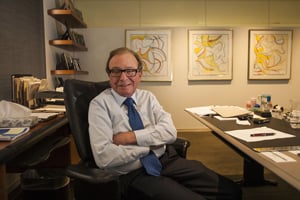Fred Sands is a name many local homebuyers know well. Sands built his eponymous brokerage into the second-largest real estate and financial services firm in California and the seventh largest in the country before selling it to Coldwell Banker in 2000 for a nine-figure payday. While Sands’ face might no longer be on L.A. billboards, he’s hasn’t stopped making deals. The year he sold his company, Sands started Brentwood investment firm Vintage Capital Group, which invests in shopping centers and has stakes in 11 properties across the country. He endowed the Fred Sands Institute of Real Estate at Pepperdine University in March, though neither Sands nor the school would disclose the size of the endowment. The Business Journal caught up to Sands, now 77, recently at his office to ask about what he’s been doing lately, whether he sees a bubble forming in residential real estate and why he made the Pepperdine endowment.
Question: What drew you to the real estate business in the first place?
Answer: The markets are inefficient. Who’s to say what a piece of real estate is worth? That inefficiency fascinated me and I’ve stayed with the industry for three decades.
What do you think about all the international investment in residential real estate here?
We’ve seen the Japanese come in a long time ago and now you have the Chinese. I think the investments are a good thing for the sellers but not as good for the buyers. More investments drive prices up and make it harder for the average Joe to buy a house.
Besides the Chinese, who else is buying?
Russians. They’re investing in everything from single-family homes to office buildings and retail centers. It’s been a gradual process, but they’ve been coming here for the last three or four years.
What attracts them to Los Angeles?
They feel that we are underpriced compared to other parts of the world, like New York. L.A. is a beautiful city with a great climate. It’s also a very stable place to invest. Other places in the world can be more dangerous.
As home prices continue climbing, do you see another bubble forming?
I don’t think so. What does worry me is who is going to be able to afford a house. Prices have gone up but wages have hardly gone up at all. Unless you’re involved with something like a hedge fund that makes a lot of money, you won’t be able to buy a house. There are plenty of people building houses in Bel Air or Beverly Hills, but the average Joe is going to have a hard time because the wages have gone nowhere.
Do you miss the residential world?
I enjoyed the residential market, but there was a lot of stress and I grew tired of it. There were lawsuits. For an instance, we sold a house in Malibu that collapsed and a few people died or were injured. We didn’t build the house, but that goes with the territory. I’d done it long enough and wanted to do something else, so I went into commercial real estate.
Why invest in shopping malls?
I like that you can buy one that is overleveraged or needs work and make a difference. You go in there, use your creativity, put in better tenants and turn the business around. We’re not happy until we’ve turned them around.
How do you turn a property around?
You need a good mix of tenants. You need the large anchor tenants like Forever 21 or Macy’s. Once you have them, you need the smaller tenants. With an office building, we don’t care what a company does as long as they pay rent. With retail, you want a different mix of tenants that will drive people to the mall. For an instance, we just put in a 13-screen theater in one of our malls in Carson. Putting a theater in a mall drives the revenue up 12 to 15 percent.
How do you choose investments?
We are very selective. We examine a mall’s potential for growth and ask retailers if they want to be there. That’s the biggest criteria.
Why did you make the endowment at Pepperdine?
Pepperdine is the only school in Southern California that didn’t have a real estate program. I couldn’t believe they didn’t have one, so I sat down with the president. We became fast friends and we decided to start one. It’s a wonderful thing. We’ll have a certificate program with seven programs and a master’s degree in real estate. So whether they want to be a developer or a broker, they will be well equipped.
Do you plan to lecture there?
I won’t be an instructor but I’ll give a few seminars here and there. They will be about the future of L.A. real estate, both commercial and residential, what’s going on in those markets and their future.

